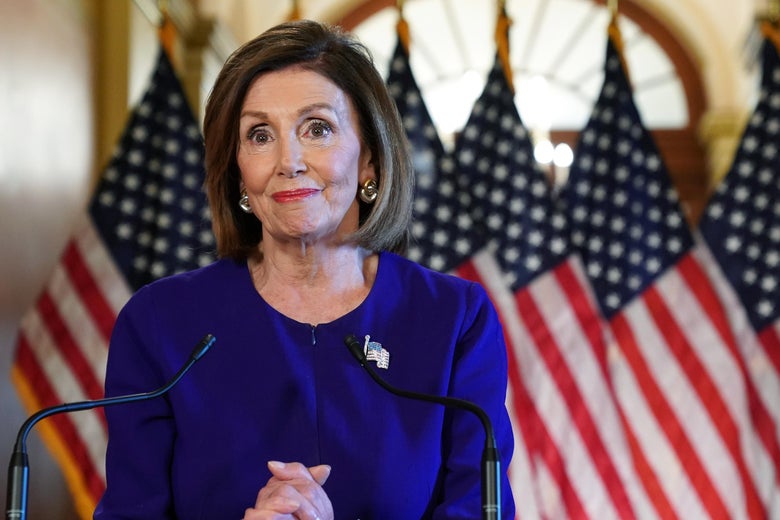
U.S. House Speaker Nancy Pelosi announces a formal impeachment inquiry at the Capitol Building on September 24, 2019 in Washington, DC.
Alex Wong/Getty Images
At her Sept. 12 weekly news conference, House Speaker Nancy Pelosi got so fed up with questions about her support for impeachment that she curtly told reporters she wouldn’t say anything more on the subject. Twelve days—and one explosive scandal involving the president allegedly extorting a foreign country for dirt on a political opponent—later, Pelosi was saying more about it.
“Today, I am announcing the House of Representatives is moving forward with an official impeachment inquiry,” she said at a Tuesday afternoon press conference, after hours of meetings with Democratic leaders, committee chairs, and the rest of the House Democratic Caucus. “I am directing our six Committees to proceed with their investigations under that umbrella of impeachment inquiry.”
It was not immediately clear what the announcement would materially change about the existing committee investigations into the president—the ones currently examining everything from the Mueller investigation into Russian interference to Trump’s tax returns to the Ukraine aid situation. House Democrats, speaking to myself and an ungodly amount of other reporters on Capitol Hill Tuesday afternoon, mostly surfed metaphors when asked to explain how life would be different under the impeachment umbrella.
“If you want to put a name to it, call it Phase Two,” Virginia Rep. Gerry Connolly said. “I think it has an imprimatur—a consensual imprimatur, at least with our caucus, that we didn’t have before.”
“It’s to send a signal to the president: You’ve gone too far,” Missouri Rep. Emanuel Cleaver told me.
“The emphasis,” New York Rep. Alexandria Ocasio-Cortez said of what’s different.
“The power behind that, the weight behind that, adds an urgency and an expeditiousness to the investigation.”
The confusion about what, if anything, has changed, does not mean that nothing has changed or that Pelosi’s announcement wasn’t significant. Pelosi, along with other important newcomers to the impeachment-inquiry cause in recent days, has said before that if you open an impeachment inquiry, you need to be prepared to impeach. With her announcement, Pelosi is saying that she is—and expressing confidence that her caucus is, too.
The strategy, however, has not been fleshed out. There is a loose plan, as Ways and Means Committee Chairman Richard Neal told reporters following a meeting in Pelosi’s office, for the six chairs of committees investigating the president to compile potential articles of impeachment and refer them to a centralized process in the House Judiciary Committee. But there’s no timeline for when they would do that. And there’s no plan for the House to vote on a resolution specifically establishing an impeachment inquiry, though they don’t necessarily have to do that.
The all-of-the-above approach towards soliciting impeachment articles from various committees is already earning some sharp feedback from the vulnerable members who’ve put their necks on the line to support impeachment. Several of the more national-security focused members, who linked arms and took the plunge in support of impeachment in a Washington Post op-ed Monday night, want the impeachment inquiry to focus explicitly on the Ukraine controversy. They like it for its simplicity.
“At least for the national security folks, this was qualitatively different,” Rep. Elissa Slotkin told reporters. “And it was important to see the distinction between everything else that’s come before it and this. And that’s why we came out [for impeachment]. It’s clear, it’s understandable, it’s strategic, and we need to bring the country along with us.”
“We haven’t done a good job as a caucus in communicating clearly what the real problem is, and what we’re trying to investigate,” she continued. “We have many committees, all having many hearings and subpoenas, and frankly, a lot of people have lost the thread.”
Democrats took it as a good sign that just as they were opening the impeachment umbrella, the president appeared to move on releasing the two items that Congress has been hoping to get its hands on. In a tweet, Trump said that he was preparing the release of his July call with Ukrainian President Zelensky, and Politico later reported that the administration was also “preparing to release to Congress by the end of the week both the whistleblower complaint and the Inspector General report that are at the center of House Democrats’ impeachment inquiry.”
“I think the peril finally dawned on the president that by stonewalling us,” Connolly said, “you’ve pushed us into the very thing you really don’t want.”
While Democrats were happy to see their inquiry produce the first signs of compliance from the White House in months, they weren’t exactly celebrating. California Rep. Brad Sherman, one of the first members to call for an impeachment inquiry in 2017—a fact he noted without prompt—called it a sad day that this had to be done. And though there are now more than 200 Democrats on board with opening an impeachment inquiry, the holdouts still exist. Centrist Oregon Rep. Kurt Schrader, for example, told me that this was a “terribly risky” move for vulnerable members.
Even Cleaver, despite representing a comfortably Democratic seat, didn’t come out in favor of an impeachment inquiry until late this summer, explaining that he was “extremely reticent about going for impeachment. I held out for almost as long as anybody.”
“I want an infrastructure bill, I don’t need impeachment,” he told me. “I fought this thing hard, I got criticized at home for not coming out in favor of it.” He was, and is, concerned about the divisiveness it could exacerbate. “We’ve already created two separate nations, one red and one blue, and this is going to deepen the divide.”
I asked him, then, if the president should be impeached if the Ukraine allegations are true.
“I don’t think there’s any question.”
Readers like you make our work possible. Help us continue to provide the reporting, commentary and criticism you won’t find anywhere else.
Join Slate Plusfrom Slate Magazine https://ift.tt/2mVaiqe
via IFTTT
沒有留言:
張貼留言